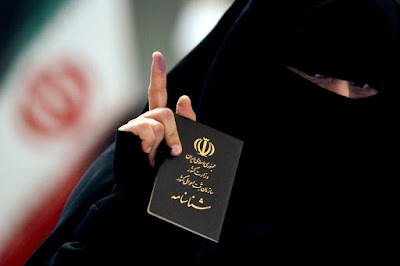Presidential elections were held in Iran on 18 June 2021. Ebrahim Raisi won with 62 percent of the votes (17.8 million out of 28.6 million votes). It was the thirteenth presidential election in Iran since the establishment of the Islamic Republic in 1979. Under the 1979 constitution, Hassan Rouhani, the incumbent president, was ineligible to run for re-election as he was limited to two consecutive terms or eight years in office. Reporters Without Borders (RSF) reported 42 cases of journalists being summoned or threatened for writing about candidates. There were calls to boycott the election, and the chief of the police threatened against telling people to not vote. At 48%, the election had the lowest turnout in the Islamic Republic's history. More than 4 million votes were void.
The President of Iran is elected for a four-year term by universal adult suffrage with a minimum voting age of 18. The presidential term is renewable once in a consecutive manner. It is the country's highest directly elected official, the chief of the executive branch, and the second most important position after the Supreme Leader. "Under Iran's political system, it is ultimately the Supreme Leader, not the president, who makes the final call on all major matters of state." According to Islamic Republic of Iran's constitution, any Iranian citizen who believes in Shia Islam, loyal to the Constitution, the ideology of Guardianship of the Islamic Jurist and the Islamic Republic can participate in election as a presidential candidate. An institution called the Election Monitoring Agency (EMA), managed by the Guardian Council vets registered candidates and selects a handful to run in the election.
The Guardian Council does not publicly announce the reason for rejections of particular candidates, although those reasons are privately explained to each candidate. Women are not constitutionally restricted from running; however, all women who registered as candidates have been excluded from standing for election by the Guardian Council. "We have not rejected any woman due to being a woman", the spokeman of the Guardian Council said. He clarified that there is no obstacle for women's registration in the elections.
Those approved by the Guardian Council are put to a public vote on the weekend. The winner is the candidate who receive a majority (50% plus one) votes. If no candidate receives enough votes another election is held between the two candidates with the most votes the following Friday. Iranians who voted during the election receive a stamp that indicate so on their birth certificates. According to the constitution, once the result is known, the Supreme Leader must sign the decree of the elected president, and if he refuses to sign, the elected president will not assume the presidency. So far, Supreme Leaders have always signed the decree of the elected president. After that, the elected president must recite and sign an oath in a session of the Islamic Consultative Assembly, in the presence of the to the members of the Guardian Council and the head of the Supreme Court. In the Oath, the elected President must swear that he will guard the official religion (Islam), protect the Constitution and the Islamic Republic, and that he will dedicate himself to the service of the nation, its people, and its religion (among other things).















0 Comments